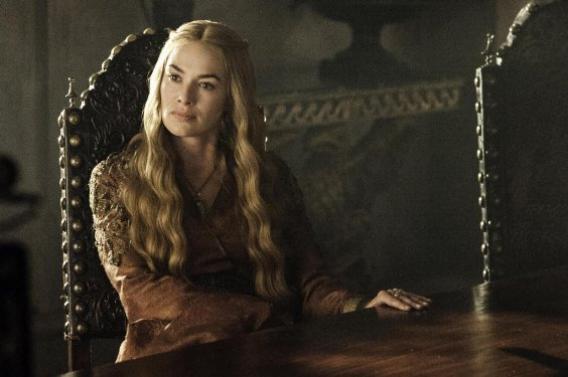With the third season of Game of Thrones fast approaching—the premiere is on Sunday night—questions abound concerning the future of its many characters (at least for those who haven’t read the books). What will Tyrion do now that he’s been stripped of his position? How will Danearys raise her army? When will Catelyn discover the various fates of her scattered children?
I find myself most intrigued, though, by the fate of Cersei Lannister (Lena Headey), the scheming, incestuous Queen Regent who fits squarely into the grand tradition of the evil blonde.
I expect this feeling is not widely shared. Cersei’s three children are the product of her relationship with her twin brother Jamie, and she takes extreme measures to prevent anyone from finding out. She’s arranged the death of her husband, King Robert Baratheon; arrested doomed but honorable Ned Stark for treason; and encouraged Jamie to push a 10-year-old boy out of a window. These power grabs set much of the show’s narrative in motion, and yet, for most of the first season, Cersei herself wasn’t all that interesting. She had some great lines—coolly informing clever whoremaster Petyr Baelish that, in fact, knowledge is not power, “power is power,” for instance—but she was a cardboard villain, almost comically manipulative.
In the fifth episode, though, called “The Wolf and the Lion,” we learned why her marriage is so dysfunctional. Cersei and Robert openly discussed how much they dislike each other, and Cersei admitted that when she was 17 and newly married, she loved him deeply. Back then, it was Robert who neglected the marriage—because his first love, Lyanna Stark, had died, and “seven kingdoms couldn’t fill the hole she left behind.” Watching them talk, it’s easy to imagine how their union might have been a harmonious, if not quite loving, one, were it not for the death of their first and only child, and Cersei’s subsequent affair with Jamie.
The deepening of her character that began in that scene continued in the show’s second season, though she remained, for the most part, just as nasty. When things went wrong for Cersei, she became genuinely thrilling to watch—and even a little sympathetic (getting in on the Joffrey-slapping action didn’t hurt). Cersei tends to be spiteful to the point of self-defeat, but the driving force behind her anger is clear: She’s trying to protect her children.
Her methods are nonetheless difficult to condone, and her single-mindedness can be dangerous. But her resentment for the limits imposed on her gender wins at least some of our sympathy. “I should have been born a man,” she says, and perhaps she’s right. Cersei is ambitious, ruthless, and conniving, but has no way to channel her skills except in the service of her family, and particularly her eldest son. Had Cersei been able to seize power for herself, she wouldn’t have needed to manipulate Joffrey onto the throne, and would have avoided all the trouble that ensues.
Her ambition also warps her parenting. Though Joffrey is clearly insane, Cersei encourages his paranoia and his arrogance, with adages like, “Everyone who isn’t us is an enemy.” Still, watching her break down in front of her brother Tyrion, and admit that she feels responsible for her son’s madness, is heart-wrenching. “What if this is the price?” she asks. “For what we’ve done. For our sins.” There is no evil queen here, just a distraught mother.
Having realized her culpability, she tries to bond with Sansa Stark, Joffrey’s much abused betrothed. Bereft of her own daughter, who’s been sent to the distant province of Dorne, she tries to impart her philosophy to the beleaguered Sansa. “The more people you love, the weaker you are,” she says. “You’ll do things for them you know you shouldn’t do, you’ll act the fool to make them happy, to keep them safe. Love no one but your children. On that front a woman has no choice.”
In “Blackwater,” one of Season 2’s stand-out episodes, Cersei sits on the Iron Throne holding her youngest child, Tommen, convinced that Stannis Baratheon will soon take King’s Landing in battle. She reassures her son, telling the story of a mother lion and her cub. “I will keep you safe,” she promises, as she raises a vial of poison to his lips. That she is interrupted by her father, who has ended the battle in her family’s favor, doesn’t lessen the horror—or the pathos—of what she was willing to do in the name of maternal love. Motherhood is Cersei’s greatest strength, and her greatest tragedy.
Previous Character Studies:
Patty Hewes, Damages
Dexter Morgan, Dexter
Adam Sackler, Girls
Shirley Bennett, Community
April Ludgate, Parks and Recreation
Tyrion Lannister, Game of Thrones
Sally Draper, Mad Men
Pamela, Louie
Sterling Archer, Archer
Dougie, Enlightened
